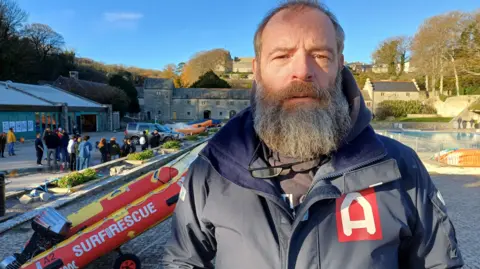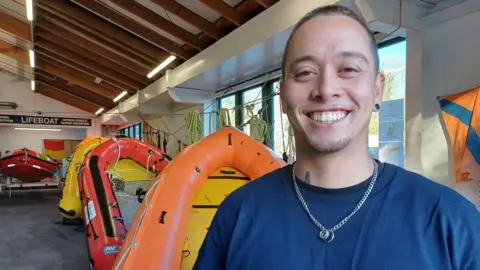Students upset by sea deaths learn how to rescue migrants
 BBC
BBCSixth form students who are angry at the number of deaths of migrants at sea are learning skills to help rescue them.
Robin Jenkins, the boss of a charity based at Atlantic College in St Donats, Vale of Glamorgan, has been involved in missions including the rescue of 32 people, with one baby and three unaccompanied children on-board, from an "unseaworthy" rubber boat.
Mr Jenkins said students from around the world come to the college and take a course which teaches skills such as repairing inflatable boats so they can help.
The Home Office has pledged to "stop at nothing" to dismantle people-smuggling gangs that organise small boat crossings.
Mr Jenkins said the Mediterranean Sea was "littered with skeletons and it's a horrible situation”, while 2024 has also been the deadliest for people dying in the English Channel.
There are students from 90 countries at the independent sixth form college, and Mr Jenkins said: "In the Mediterranean there are young people who have seen this terrible narrative unfold on the television and said 'no more, I can't watch this, I must get involved'.
“The students here are angry and coming from all around the world, some of the students here will have experienced these horrors themselves, or will have been closely connected.”
Since 2018, more than 147,000 people have come to the UK on small boats.
Solving the problem has been a major focus for successive governments, and current Prime Minister Keir Starmer vowed to use counter-terrorism tactics to stop people-smuggling gangs "before they act".
The Central Mediterranean is the main migratory route into the European Union and is known to be the world’s most dangerous.
In total, there have been 1,983 fatalities recorded by the International Organisation for Migration (IOM) linked to the route this year.
Mr Jenkins said many people were fleeing war, oppression and poverty.
He added: "The misinformation that is surrounding the whole thing is part of the problem, they are told this is going to be easy.
“They're told it's going to be safe, they are told that Europe is waiting with open arms for them, and they’re extorted often."
Atlantic Pacific International Rescue, based at Atlantic College, provides lifeboats, crew, and training programmes.
“Not only are people in a state of distress when you rescue them, they have come from a long journey of distress, exploitation and torture," Mr Jenkins added.
In the 1960s, students at Atlantic College invented the rigid-hull inflatable boat or RIB design.
With its solid bottom and flexible sides, the RIB has become a cornerstone of modern boating, with use for leisure, by the military and, crucially in life-saving.
The college sold the rights to the RNLI for £1 but the legacy lives on.
Students are now repairing an inflatable RIB as part of their training on the Atlantic Pacific course.
They are also learning about boat building, operating and maintaining them, and are introduced to sea rescue.
'You're in shock'
On 3 September, six children and a pregnant woman were among 12 people who died after a boat carrying dozens of people sank off the French coast.
A month later, four people, including a two-year-old boy, died after seemingly being "trampled to death" on two separate boats.
According to IOM’s Missing Migrants Project, 54 migrants have drowned in the English Channel so far this year.

Theo Tran, 23, is a trainer with the charity, and has been involved in Mediterranean sea rescue operations.
He grew up in Vietnam before moving to the UK at 15, and studying at the college, and said it was always the "end goal" to help with the refugee crisis.
“Although you are tired and you're in shock, you feel a certain pride in the work that you do, because you know you're doing the right thing, as hard as it might be to be out there," he added.
A Home Office spokesman said: "We all want to end dangerous small boat crossings, which threaten lives and undermine our border security.
"The people-smuggling gangs do not care if the vulnerable people they exploit live or die, as long as they pay."
This story was updated on 7 January 2024 to remove some of the details of the students taking part in the course.
